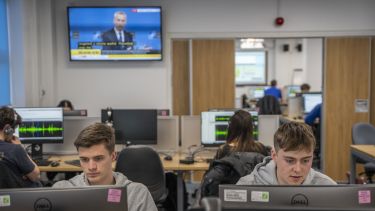Explore this course:
Applications for 2024 entry are now open. Apply now or register your interest to hear about postgraduate study and events at the University of Sheffield.
Journalism
School of Journalism, Media and Communication,
Faculty of Social Sciences

Course description
News reporting requires expertise in creating and publishing digital content, alongside a solid grasp of traditional skills and knowledge - take this degree and you’ll develop both. You will harness your knowledge in our newsrooms and out in the city during our production newsdays. You'll also work with a team to publish your stories on Sheffield Wire – a real, public-facing news website with its own social media channels.
You'll apply your learning in a huge variety of ways: news writing, web publishing, shorthand, social media management, video production and media law and ethics - all in the process of hunting down and writing up stories to meet real-time deadlines with your team.
As well as the core reporting skills required by employers, you’ll also be exposed to innovative journalism techniques, which will put you a step ahead when it comes to landing your first job.
Our course is accredited by the National Council for the Training of Journalists and is renowned within the industry as one of the best in the UK. We'll give you access to international, national and regional news providers on a myriad of platforms during both teaching time and exciting work placements.
Our alumni are intelligent and successful journalists who are excellent at both traditional newswriting and digital mobile journalism.
Accreditation
Accredited by the National Council for the Training of Journalists
Modules
Core modules:
Teeline shorthand
- Researching News
-
Finding, researching, and developing news stories is a basic journalistic skill and one that is common to all media. This module is intended to equip students with the understanding, knowledge, insights and skills necessary for effective journalistic research and news gathering. It seeks to develop in students some of the basic practical skills involved - such as effective interviewing and researching - with the development of 'news sense' and an understanding of the potential sources of news in a variety of settings. It will demonstrate the generic nature of news gathering skills across all media.
15 credits - Writing News
-
This unit is designed to introduce students to the discipline of writing news and writing for publication and relate that to an understanding of the relationship between the practice of journalism, the production values of the media and the definitions of news. Students will learn to write clear succinct and accurate English, which both presents the reader with a logical and readable narrative and demonstrates a positive understanding of appropriate news values. They will learn to apply their skills through a number of exercises of varying complexity.
15 credits - Law for Journalists
-
This module aims to develop students' understanding of legal constraints on journalists working in the UK, including defamation and contempt law. Students will also study how matter can be published in the public interest, and how a journalist can challenge invalid restrictions. There will also be a study of the Editors' Code of Practice and the Ofcom Broadcasting Code.
15 credits - Ethics and Regulation
-
This module examines some of the major ethical controversies in journalism. Students will explore debates about the tension between freedom of expression and the exercise of responsibility, and about the need to balance privacy rights with publishing material in the public interest. There will also be study of regulation, truth-telling, media representation of vulnerable groups and journalists' relationship with their sources. Students will explore how ethical behaviour is encouraged in journalism, and consider how the industry codes seek to achieve this in the UK.
15 credits - Power and Society - The Institutions of Government
-
This unit explores the institutions and organisations which significantly affect the nature of our society and which effect change within it. It explores the nature of the relationships between local, national and international institutions of government and seeks to equip journalists to understand how those relationships reflect or effect the decision making processes in society. It will also examine the structures and processes of the institutions of government at local, national and European level.
15 credits - Advanced Journalism
-
Writing effectively for print means understanding the wide range of disciplines involved in the production of the finished product. This unit will introduce students to those disciplines. They will be introduced to the practice and principles of newspaper design and production through desk top publishing. They will develop their understanding of newsgathering and writing skills through experience of a range of events such as Crown Court trials and local authority meetings. They will be introduced to the disciplines of feature writing and gain an insight into the different approaches to sustained narrative.
30 credits - Journalism Portfolio
-
This module requires students to submit a portfolio of journalistic work accompanied by detailed explanations of the background work involved. The portfolio of journalistic work should demonstrate the student's ability to initiate ideas and undertake the necessary research to produce a finished and substantial piece of journalism in one area of the media. The subject/s must be approved by a course tutor beforehand via an assessed video pitch. The portfolio should be made up of a range of stories which together should total at least 8,000 words or 10 minutes of broadcasting and be accompanied by a description of the development and research involved in its production totalling at least 4,000 words.
60 credits
Optional modules
You will choose one from the list below.
- Dealing with data for journalists
-
News reporting relies increasingly on knowing how to understand and analyse data. "Now that information is abundant, processing is more important." (Philip Meyer). Data science is the scientific discipline that feeds into this new type of journalism. It provides methods for collecting and systematizing data, which is then analysed using a combination of statistical and machine learning techniques, and finally presented in an appealing and understandable format. This module will equip students with the confidence to appreciate and apply the most widely used statistical techniques, which constitute the very core of data science and, hence, facilitate responsible evidence-based journalism.
15 credits - Communicating with the Media
-
This module will provide students with knowledge and skills necessary to communicate messages through the media. Case studies and practical workshops will allow students to learn about the practice of media communication. They will learn how the media operates and how to communicate messages through interviews, press conferences and news releases. Topics covered in the module will include the development of communication strategies, the understanding of news values and news cycles and strategies for successful and ethical communication.
15 credits - Critical Incidents in International Journalism
-
In this module students will explore and analyse international critical incidents (for example, in the UK, US, Asia and Africa) and the efforts to ensure high-quality journalism that follow them. Students will engage in the critical analysis of media reform history, theories and perspectives related to critical incidents in journalism. Additionally, students will have an opportunity to develop their own media reform project and/or participate in an existing one.
15 credits - Radio and NGO Communication in conflict-affected areas
-
Non-governmental organisations (NGOs) and other such organisations are valuable information sources, mediators and actors in conflict-affected zones and use local media, particularly radio, to amplify their messages, programmes and advocacy. This module focuses on, and engages with, the public and political communication used, and sometimes misused, and even abused, by radio and NGOs, internationally and historically, during times of conflict and the challenges they encounter culturally, politically, economically, legally and institutionally. In this case, 'internationally' means from the perspective of the Global South.
15 credits
The content of our courses is reviewed annually to make sure it's up-to-date and relevant. Individual modules are occasionally updated or withdrawn. This is in response to discoveries through our world-leading research; funding changes; professional accreditation requirements; student or employer feedback; outcomes of reviews; and variations in staff or student numbers. In the event of any change we'll consult and inform students in good time and take reasonable steps to minimise disruption.
Open days
An open day gives you the best opportunity to hear first-hand from our current students and staff about our courses.
Find out what makes us special at our next online open day on Wednesday 17 April 2024.
You may also be able to pre-book a department visit as part of a campus tour.Open days and campus tours
Duration
MA: 1 year full-time
Teaching
There are lectures, seminars, group workshops, individual and team assignments.
Assessment
You’re assessed on essays, examinations and practical journalism work – producing news stories, newspaper pages, web pages and portfolios.
You’ll also have the chance to sit external examinations set by the NCTJ.
Your career
Our graduates launch straight into work as journalists, trainee news reporters, content writers, digital PR specialists, video journalists and more within just 15 months of graduation. Many of them find work in huge news organisations like Reach, JPI media and Bloomberg - others launch successful careers as freelance journalists (Graduate Outcomes Survey 2020/1).
Thanks to our industry connections, we offer a huge range of work experience opportunities to students on our practical journalism programmes. To see what our students get up to during these placements, check out the #JUSPlacement hashtag on X or read the #JUSPlacement Blog.
You can also find out more about our graduates and where they go on to work.
Department
School of Journalism, Media and Communication
Here at the School of Journalism, Media and Communication, we've been training extraordinary journalists and conducting pioneering research since 1994, when our department was launched by Observer Editor Donald Trelford at our first home in Minalloy House.
After 30 years in the industry, we've learnt a thing or two about networking. Study with us, and you'll have exclusive access to our unrivalled contacts and alumni network, situated in newsrooms across the world.
We’ll also provide you with award-winning employability support in the form of one-to-one support sessions, weekly masterclasses and an array of placement opportunities to help you get your foot in the door.
You’ll learn to ace the basics on our practical courses, including how to spot big stories and make them shine; edit engaging audio, video and podcasts in our state-of-the-art facilities; become an expert in social media; and even ace those shorthand exams. We’re the only Russell Group University to be accredited by the NCTJ, BJTC and PPA, so you know you’re learning from the best of the best.
For those with an eye for Journalism’s bigger picture, our research-led programmes will help you piece together the epic social narratives of global journalism, mass media and political communication. You’ll be rubbing shoulders with experts in media law, mis/disinformation, propaganda and freedom of the media - taking full advantage of the research excellence we have to offer as a Russell Group institution.
Our graduates go on to achieve great things and remain part of our legacy forever. They change the world through the power of storytelling - be they journalists, documentarians, PR experts, novelists, or teachers.
Entry requirements
Minimum 2:1 undergraduate honours degree.
We may also consider your application if you do not meet the standard academic requirements but you have considerable work experience in a media-related role.
Overall IELTS score of 7.5 with a minimum of 7.0 in each component, or equivalent.
If you have any questions about entry requirements, please contact the department.
Fees and funding
Apply
You can apply now using our Postgraduate Online Application Form. It's a quick and easy process.
Contact
journalism-admissions@sheffield.ac.uk
+44 114 222 2500
Any supervisors and research areas listed are indicative and may change before the start of the course.
Recognition of professional qualifications: from 1 January 2021, in order to have any UK professional qualifications recognised for work in an EU country across a number of regulated and other professions you need to apply to the host country for recognition. Read information from the UK government and the EU Regulated Professions Database.


.png.jpg?itok=xLR577bd)

